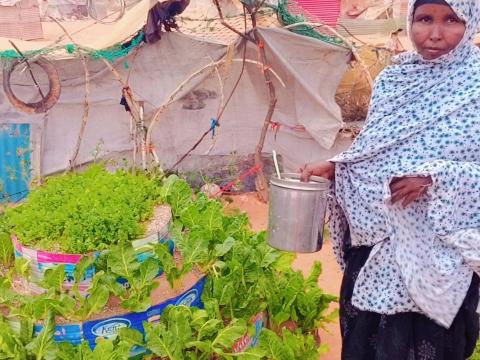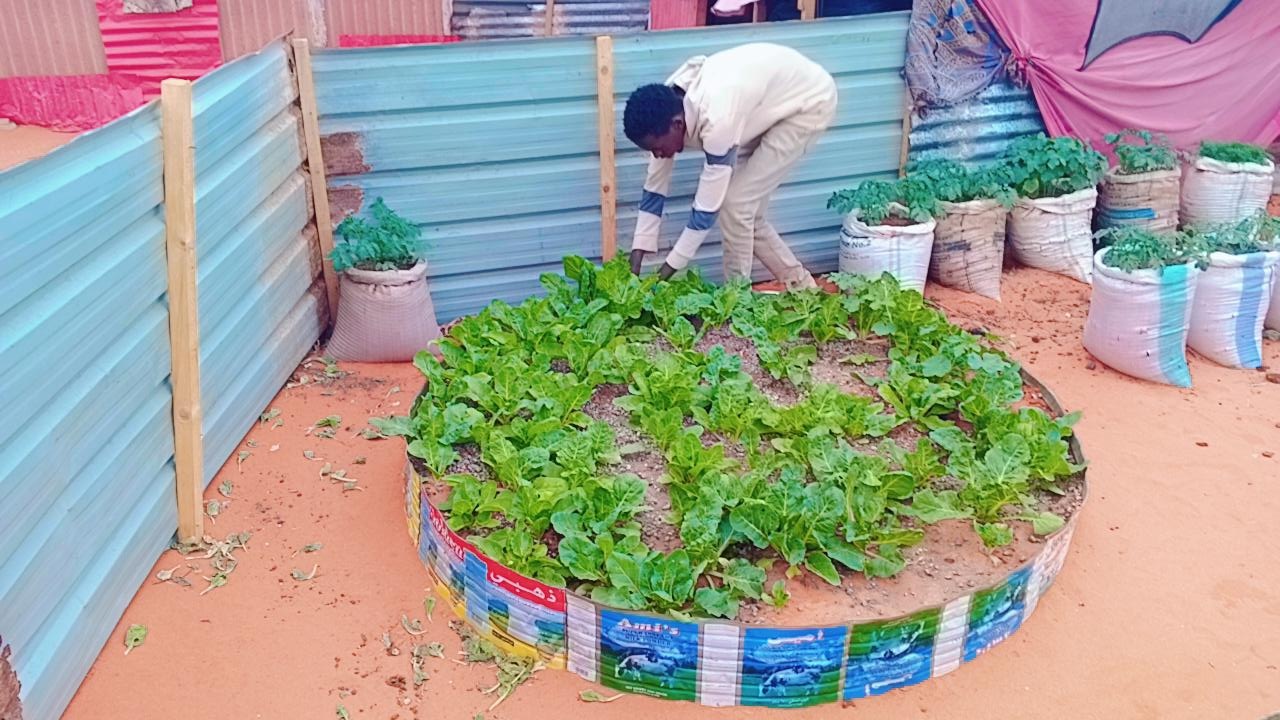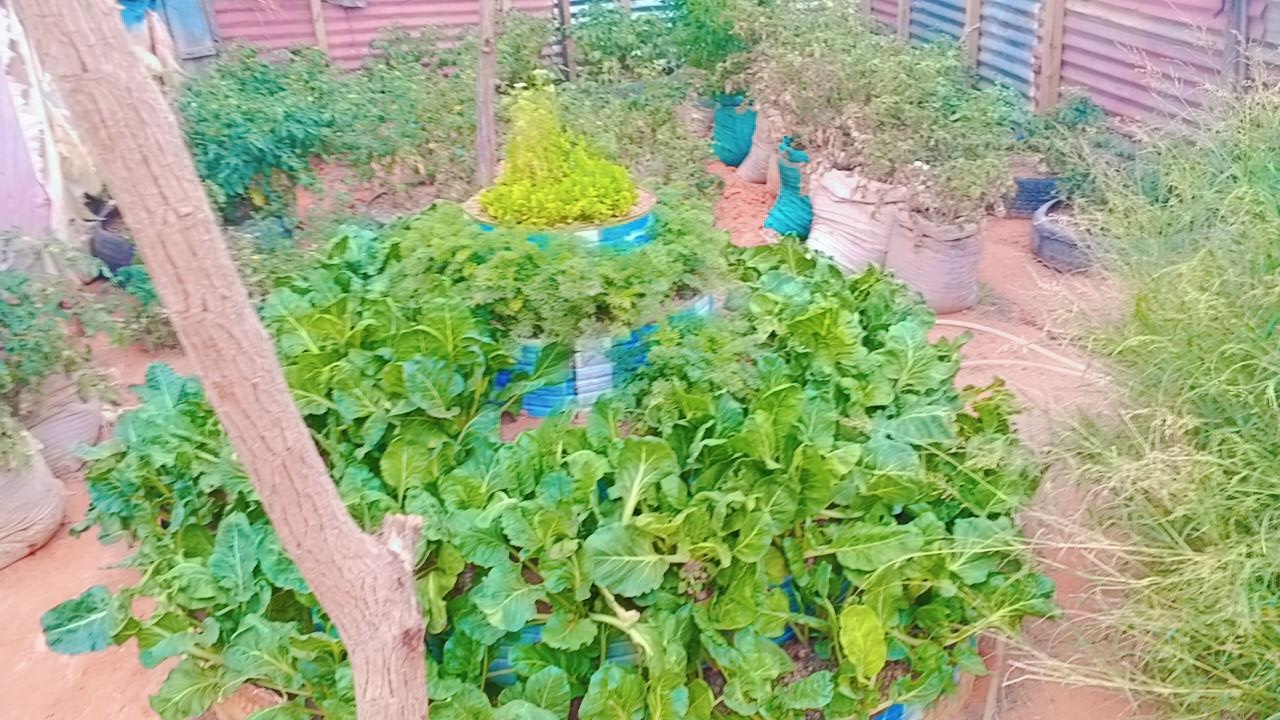Sowing Hope, Harvesting Dignity: Home Gardening Transforms IDP Lives

Climate change-exacerbated droughts decimated Puntland's traditional livelihoods, forcing pastoralist families to lose livestock and small-scale farmers to struggle without seeds, tools or water. Vulnerable households, including female-headed families, IDPs, and the elderly, suffered most, facing income loss, poor nutrition, and increased reliance on food aid.
In Jeexdin village, this crisis was deeply felt. Families like Faduma’s, who once depended on livestock, and individuals like Siradi, who fled conflict or discrimination, arrived at the IDP camp with no means to survive other than emergency aid. The land was dry, the environment harsh, and markets lacked affordable fresh food.
“Before the drought struck, I lived a modest but fulfilling life as a pastoralist in rural Somalia. My family depended entirely on our livestock; they were our main source of food, income, and security.
Everything we had was tied to the animals we raised. But when the drought came, it changed our lives overnight. The land dried up, water became scarce, and our animals began to die. One after another, we lost them, and with them, we lost our livelihood, our hope, and our sense of stability.
In the early days, we relied fully on food aid to survive. Although we were grateful for the assistance, it was clear that this could not be a permanent solution. My children needed more than just daily rations, they needed stability, nutrition and a future. I knew I had to find a way to regain some independence and create a life with dignity, even in displacement.” Said Faduma
Siradi, whose family was also displaced due to the drought, added:
“Living alone in Jeexdin IDP camp, I faced ongoing challenges. Without a stable income and limited access to fresh food, my meals were repetitive and lacked nutrition. Most of what I ate came from food aid distributions, and when I managed to buy vegetables, they were overpriced and barely fresh. I never used to get vegetables. In a whole month, I could only get half a kilo of something lifeless from the market."

Through the Joint Resilience Project (JRP) by World Vision, with support from the World Food Program (WFP), Faduma and other households received drought-tolerant vegetable seeds, farming tools, on-site coaching by skilled agricultural extension officers and agronomists, training on good agricultural practices, fodder production, and post-harvest management. World Vision teams followed to ensure households applied what they had learned and to provide technical support.
This helped the households shift from dependency to self-reliance, as they were able to grow crops and sell the surplus to meet household needs.
The project aims to address severe and persistent food insecurity and livelihood vulnerabilities affecting households in Galkayo District, Puntland State, including those displaced and resettled in areas like Jeexdin village.
“With support from the resilience program, we were allowed to start a small home garden. With the seeds and basic tools, I received, I began cultivating vegetables and fruit crops next to our shelter.
Slowly but surely, the garden grew. Today, my home garden has become a lifeline for my family. It provides us with fresh fruits and vegetables for daily consumption, which has significantly improved our diet and health.
Not only that, but I also now sell the surplus produce in the nearby village market, earning a small income that helps me buy other essentials for my children. For the first time since we lost everything, I feel hopeful again. I am not just surviving, I am rebuilding.” Said Faduma
“This reality began to change when I was selected for a home gardening initiative under the Project. Through this program, I received seeds, farming tools, and on-the-job training from field staff. Although I had no background in agriculture, the training was simple, practical and easy to follow.
Soon, I began growing spinach, tomatoes, onions, and okra in a small garden next to my shelter. It became part of my daily routine, watering, caring, and harvesting. Over time, the garden began to feed more than just my body; it nourished my spirit.
Now, I prepare meals with fresh vegetables almost every day. The improvement in my diet is noticeable, and the ability to produce something with my own hands has restored my confidence and routine. For me, the home garden is not just about food, it's about self-reliance, healing, and dignity in a setting where so much feels out of my control.” Added Siradi

In Jeexdin, 68 supported households are showcasing community resilience. Families like Faduma's now enjoy fresh, home-grown vegetables daily, leading to healthier children and reduced reliance on food aid. Beneficiaries now have stable access to diverse foods, basic farming skills, and a renewed sense of dignity. For others, like Siradi, it restored a sense of independence and control over their lives.